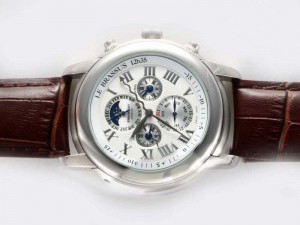 The battle for marketing share always exists among firms in same industry, including the replica watches industry. Recently, the turf war seems escalated between two Swiss brand– Audemars Piguet and Hublot. Although both of them haven’t admitted this publicly, this battle has already started a few years ago. In this case, you may wonder who would be the ultimate winner, however, as for me, I don’t think these two firms has any obvious conflicts of interests. The interesting thing is that, from my point of view, Audemars Piguet and Hublot have vastly different products. I don’t even see them as direct competitors precisely. Besides, no matter who would be the winner, competition between firms tend to bring more benefits for customers.
The battle for marketing share always exists among firms in same industry, including the replica watches industry. Recently, the turf war seems escalated between two Swiss brand– Audemars Piguet and Hublot. Although both of them haven’t admitted this publicly, this battle has already started a few years ago. In this case, you may wonder who would be the ultimate winner, however, as for me, I don’t think these two firms has any obvious conflicts of interests. The interesting thing is that, from my point of view, Audemars Piguet and Hublot have vastly different products. I don’t even see them as direct competitors precisely. Besides, no matter who would be the winner, competition between firms tend to bring more benefits for customers.
The real models that are in competition with one another are AP’s Royal Oak Offshore collection and Hublot’s Big Bang collection. Thought, in my view, I don’t seem there are many similarities between them, apparently enough people put them in the same basket. Call it the struggle of limited editions! For me the person who buys one watch isn’t necessarily in the market for the other – but takes the level of tension between the brands into consideration, the competition is real. In end, I think that having AP and Hublot always looking to one up another is a benefit for the consumer. This should mean that the products they release are exciting as possible.
Except the competition during the marketing and sales process, there is a more crucial part for these watches companies– sponsorships and partnerships. Audemars Piguet and Hublot have each been rapidly gaining high-profile ambassadors and partnerships – particularly in the US. At the first time the battle came into my eyesight was when I attended to Alinghi team that competes in the America’s Cup.
For Hublot, special partnerships are a major part of CEO Jean-Claude Biver’s strategy. Focusing only on the world of sports, in the past decades they have been named as the official time keeper of the FIFA World Cup, the watch brand partner of the Manchester United Football team, and the official watch maker of Formula 1 racing – among others. The purpose is quite obvious. A champion in any sport should wear and prefer a high-quality Swiss watch.
Most recently the fight has moved to Miami. The battle ground is the court where the Miami Heat plays. Hublot announced that Miami Heat player Dwyane Wade would be a brand ambassador in February 2011. However, merely a few days ago Audemars Piguet has just proclaimed that its new brand ambassador would be a player of Miami Heat LeBron James. Interpret it how you like, but I think the brands each want to be where the other brand is. They both get great visibility and a great player, but it is interesting to see the dynamic.
A more hostile thing is that Hublot just announced that they would be the “exclusive watch partner” of the Miami Heat. So each of them has one player on their side. Thus, now replica Hublot watches has contracted to get the exclusive rights to use the actual Miami Heat name on watches. Hublot will get their name in diverse parts of the arena, on the countdown clock, and on the Miami Heat website. Certainly, there will be other promotional connections as well to celebrate the affiliation.
Both AP and Hublot are trying to catch more eyes on their own brands. The goal for each is as much attention as possible in the American market. The US has long been a perplexing place for watch brands to set a major foothold in, but both Replica Audemars Piguet and Hublot have done admirable jobs of gaining high levels of awareness and customer adoption here in the US. The results of these mutual efforts is to have luxury Swiss brands become an progressively larger part of people’s focal point in the US – a area that for the last few years has had less consciousness of high-end watch brands than many other parts of the world. For them, the more attention people pay to their, the happier they are.
No matter who would be the final winner, it would be hard for people in those two companies. And the real winner would no doubt be the clients. Frankly speaking, fair competition would never be a bad thing. In one hand, companies would pay more attention to their research, design, development and service. In another hand, competition would be more like a chance to adjust and to grow. Normally, furious competition will lead to fast improvement. In terms of customers, besides, they do not really care about the winner thing, they only care which brand is more in line with their tastes and appreciation.


